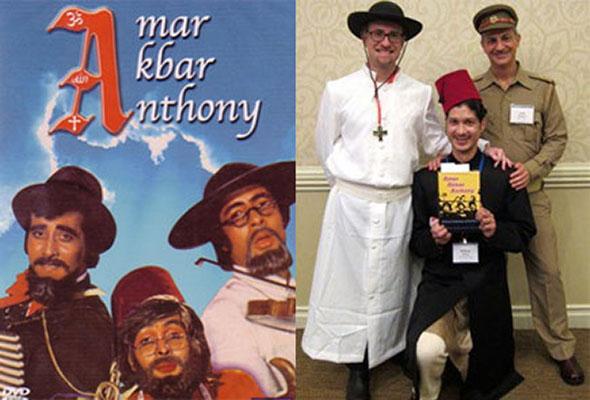
Delighting audiences with its songs and madcap adventures, the film follows the heroics of three Bombay brothers separated in childhood from their parents and one another. Beyond the freewheeling comedy and camp, however, is a potent vision of social harmony, as the three protagonists, each raised in a different religion, discover they are true brothers in the end.
Christian Lee Novetzke (Jackson School of International Studies) has published a new book, The Quotidian Revolution: Vernacularization, Religion, and the Premodern Public Sphere in India (Columbia, 2016), about the cultural politics surrounding the rise of Marathi literature in 13th-century India.
He co-authored another new book, Amar Akbar Anthony: Bollywood, Brotherhood, and the Nation, with William Elison (Religion, University of California, Santa Barbara) and Andy Rotman (Buddhist and South Asian Studies, Smith College), about a beloved Bollywood film. The book unpacks the social politics of the 1977 blockbuster, emulating the playful spirit of the film.
“Here is a scholarly work about a popular film that also tries to mimic something of the film’s controlled lunacy, winking at itself every now and again,” says a review in The Hindu.
Christian and his co-authors dressed in the same disguises the film characters wear at the end of the film for a book celebration at the Annual Conference on South Asia at the University of Wisconsin, Madison, in 2015.
More from the publisher:
Delighting audiences with its songs and madcap adventures, the film follows the heroics of three Bombay brothers separated in childhood from their parents and one another. Beyond the freewheeling comedy and camp, however, is a potent vision of social harmony, as the three protagonists, each raised in a different religion, discover they are true brothers in the end. William Elison, Christian Lee Novetzke, and Andy Rotman offer a sympathetic and layered interpretation of the film’s deeper symbolism, seeing it as a lens for understanding modern India’s experience with secular democracy.
Christian is an organizer, with Sunila Kale (Jackson School of International Studies) and Sudhir Mahadevan (Comparative Literature, Cinema & Media) of the February 2017 conference The Intellectual Chimera of South Asia, the 50th-anniversary gathering of the South Asia Conference of the Pacific Northwest, sponsored by the Simpson Center.
Congratulations, Christian!